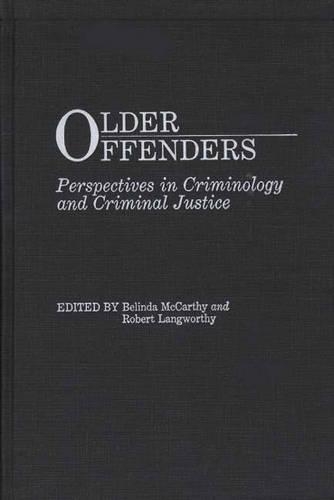
Older Offenders: Perspectives in Criminology and Criminal Justice
(Hardback)
Publishing Details
Older Offenders: Perspectives in Criminology and Criminal Justice
By (Author) Robert Langworthy
By (author) Belinda Mccarthy
Bloomsbury Publishing PLC
Praeger Publishers Inc
22nd February 1988
United States
Classifications
Tertiary Education
Non Fiction
364.37
Physical Properties
Hardback
253
Description
This book provides a systematic and scholarly examination of the major questions facing academics and practitioners working in the area of deviance and aging. Drawing on the theoretical and empirical work from established leaders in criminology and criminal justice, the editors provide large sample studies that identify the long-term trends in the area of aging and crime. This volume is a fine source of data about a minor facet of offensive behavior. Contemporary Sociology The book provides a systematic and scholarly examination of the major questions facing academics and practitioners working in the area of deviance and aging. Drawing on the theoretical and empirical work from established leaders in criminology and criminal justice, the editors provide large sample studies that identify the long-term trends in the area of aging and crime. The introduction addresses the question of the real trends among older offenders and offers a detailed review of the criminological and criminal justice literature on older offenders. The section on criminological perspectives examines the question Why does criminal behavior decline with age from both sociological and psychological perspectives. Other chapters discuss the application of social learning, control, and anomie theories of deviance to crime by older offenders; provide an econometric analysis of property crime; and consider research on alcohol abuse and homicide among elderly. The section dealing with criminal justice perspectives examines the dispositions of police, judiciary, and correctional management toward the elderly. This final section also includes coverage of special sub-populations of elderly offenders, such as violent offenders, and long-term offenders.
Reviews
There is growing evidence that the incidence of elderly crime is rising but our criminal justice system is designed to deal with the young criminals. This book fills a gap in the literature by examining the theoretical and empirical issues surrounding the problems of elderly crime. . . . The understanding of the elderly offender phenomenon provided by this book can be useful for those responsible for the elderly in foster care. As the proportion of elderly in the population increases, the number of the elderly in foster care is also likely to grow and factors that contribute to elder crime will effect them as well. Some of the explanatory theories discussed in this book can yield ideas for helping the elderly in foster care guard against feeling alienated, powerless, and useless, and for making their lives more active, purposeful, and satisfying.-Adult Residential Care Journal
This volume is a fine source of data about a minor facet of offensive behavior.-Contemporary Sociology
"This volume is a fine source of data about a minor facet of offensive behavior."-Contemporary Sociology
"There is growing evidence that the incidence of elderly crime is rising but our criminal justice system is designed to deal with the young criminals. This book fills a gap in the literature by examining the theoretical and empirical issues surrounding the problems of elderly crime. . . . The understanding of the elderly offender phenomenon provided by this book can be useful for those responsible for the elderly in foster care. As the proportion of elderly in the population increases, the number of the elderly in foster care is also likely to grow and factors that contribute to elder crime will effect them as well. Some of the explanatory theories discussed in this book can yield ideas for helping the elderly in foster care guard against feeling alienated, powerless, and useless, and for making their lives more active, purposeful, and satisfying."-Adult Residential Care Journal
Author Bio
BELINDA MCCARTHY is Associate Dean, School of Social and Behavioral Sciences, University of Alabama at Birmingham. ROBERT LANGWORTHY is Assistant Professor in the Criminal Justice Department, University of Cincinnati.
